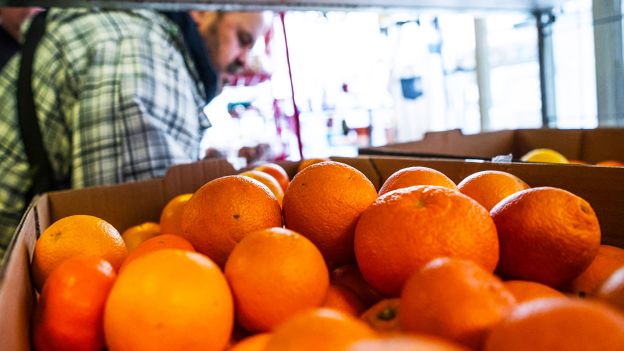
France and Belgium’s trials, which began earlier this year and last year respectively, will each run for 12 months, and the early results appear to be positive.
In the Brussels trial, funded by the country’s social welfare centre, participants from nearly 60 low-income households receive €150 monthly for one year – without having to make a contribution – to spend in one supermarket: BEES Coop. Via says so far participants are mainly purchasing dietary staples, with a small fraction allocated towards non-food items such as soap and toilet paper. Hache credits the intervention with improving her diet and easing her stress levels. “I can buy organic fruit and vegetables and bulk products in the quantities I want,” she says.
The project in Montpellier, supplemented by public and private grants, gets closer to the goal of wealthier participants contributing more for their food. For one year, each of the 400 participants, half of whom live in poverty, are required to contribute a voluntary amount between €1-150 (($1.1-159/£0.9-£133)monthly, and will receive €100 ($10/8£90) monthly, regardless of what they contributed. To prevent the allowance from being misused, the citizens’ committee behind the project issue the funds in a local currency that can be spent at five supermarkets across the city.
Emma Patterson, senior lecturer in public health nutrition at Stockholm’s Karolinska Institute, says the intervention is an excellent way of addressing structural barriers like cost and accessibility. “There’s good evidence to suggest working in a structural way is more effective than just providing information to people,” she says.
However, Patterson cautions that by restricting the funds to be spent only in certain shops, access may remain a barrier. “To have a wide impact, you need to involve ordinary supermarkets and make this available to everybody. Otherwise, you’d be benefiting people already in a position to make extra trips to special shops. You’d miss reaching out to the wider segment of the population that needs to be helped,” she says.
Enough food is produced to feed 10 billion people, yet much of the world’s population is inadequately nourished and, globally, hunger, food insecurity and malnutrition are on the rise. Even before Russia’s invasion of Ukraine, which sent global food prices skyrocketing, 3.1 billion people already could not afford a healthy diet.
From the UK to Spain to Germany to Latvia, food bank demand is soaring across Europe. It’s a similar story across the Americas. Food banks in Canada have reported record-breaking visits to food banks, in Argentina food banks are unable to meet demand and in the US food bank use is up one-third compared to before the Covid-19 pandemic.
Peuch says having to ask for food isn’t a dignified approach and that food aid, while serving a role in extreme situations, cannot be a long-term response to food insecurity. “Sometimes the state says to us, ‘we have no food problem in our country because we have food aid.’ But for us, food aid is not the right to food,” he says. “It only provides limited quantity, and [when it comes to] quality, people cannot really choose.”
Patterson agrees it’s important for people to have the freedom to choose their own food and for interventions to be designed and developed with dignity in mind.
With food insecurity a growing concern throughout Europe, campaigners think a window of opportunity to usher in changes may be opening. “When you have to eat food that you don’t want to buy, but you have to buy it because you don’t have a choice… this makes people aware,” says Peuch.
Studies show lower household income is consistently associated with poorer diet quality, as low-cost diets rely on energy-dense but nutrient-poor foods. In Scotland, GPs have reported rising cases of malnutrition due to overreliance on such foods since the onset of the cost-of-living crisis. Poor nutrition is linked to the worldwide rise of micronutrient deficiencies, obesity and preventable diseases like heart disease, stroke and type 2 diabetes.
Food insecurity is especially detrimental to the health, development and wellbeing of children, whose nutritional requirements are high during a time of rapid physical growth. Globally, childhood malnutrition is considered one of the largest public health challenges.
The strain of poor nutrition on healthcare systems is significant. A study in Belgium, for example, found healthcare costs and lost productivity costs due to excess weight totalled €4.5bn ($4.8bn/£4bn) per year between 2013 and 2017.






